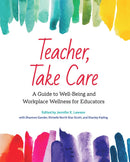Description
Edited by Jennifer E. Lawson with contributions from Shannon Gander, Richelle North Star Scott, of Anishinaabe and Métis descent, with Ancestors from St Peter’s Reserve, Elder Stanley Kipling, Cher Brasok, Monika Cichosz Rosney, Laura Doney, Dana Fulwiler Volk, Jackie Gagné, Megan Hunter, Kelsey McDonald, Keith Macpherson, Lisa Dumas Neufeld, a Métis-Mennonite educator, Sandra Pacheco Melo, and Joyce Sunada.
Written by teachers for teachers, this comprehensive resource provides strategies to improve educator wellness and foster positive mental health in the workplace.
Teaching can be a highly satisfying profession, but it can also be overwhelming. Stress management. Self-care. Mental well-being. Mindfulness. These words have become all too familiar, but what do they actually mean for you? And how can they help without adding to your to-do list?
All teachers have different experiences and different needs. Through stories by diverse educators, this professional resource invites you to try different wellness strategies, explore varying perspectives, and consider new ideas of what it means to “be well.”
Grounded in servant leadership and a holistic model, each chapter connects to Indigenous perspectives of wellness through remarks from Elder Stanley Kipling and Knowledge Keeper Richelle North Star Scott. This book contains 50 full-colour illustrations, photographs, diagrams and charts.
Written by teachers for teachers, this comprehensive resource provides strategies to improve educator wellness and foster positive mental health in the workplace.
Teaching can be a highly satisfying profession, but it can also be overwhelming. Stress management. Self-care. Mental well-being. Mindfulness. These words have become all too familiar, but what do they actually mean for you? And how can they help without adding to your to-do list?
All teachers have different experiences and different needs. Through stories by diverse educators, this professional resource invites you to try different wellness strategies, explore varying perspectives, and consider new ideas of what it means to “be well.”
Grounded in servant leadership and a holistic model, each chapter connects to Indigenous perspectives of wellness through remarks from Elder Stanley Kipling and Knowledge Keeper Richelle North Star Scott. This book contains 50 full-colour illustrations, photographs, diagrams and charts.


